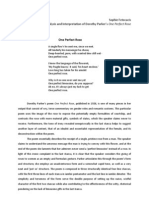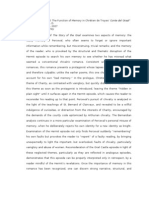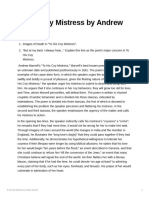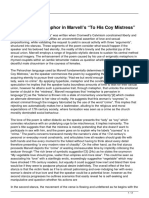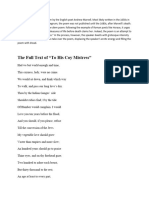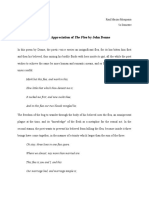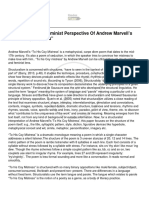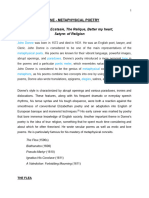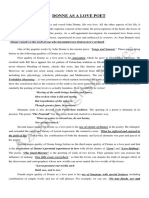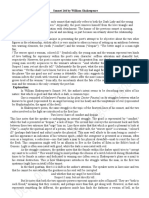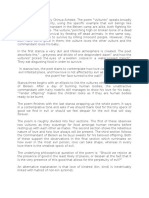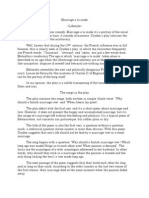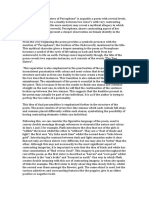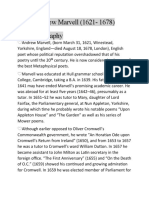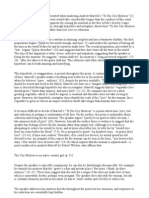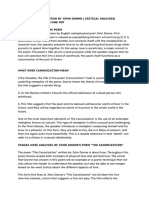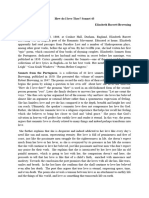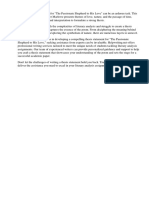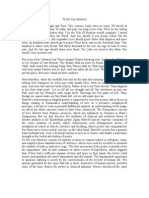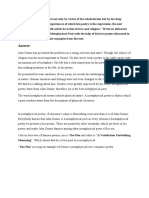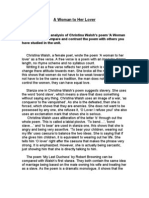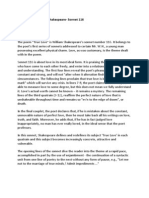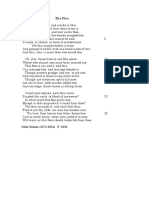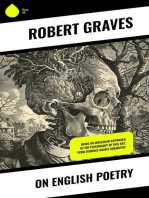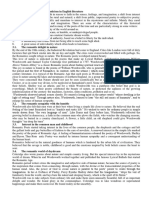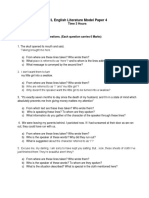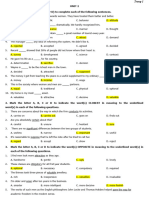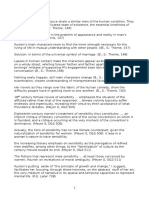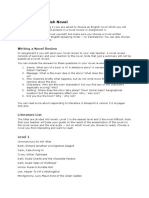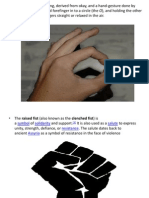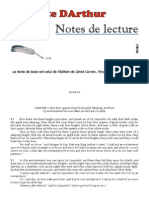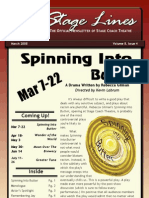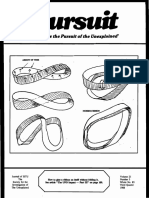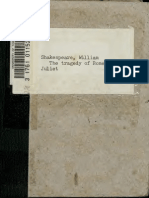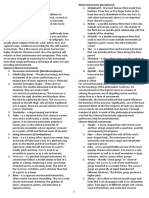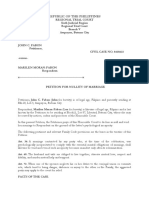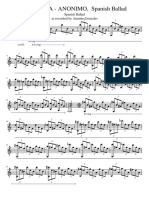Poetry Essay
Poetry Essay
Uploaded by
Alex HadfieldCopyright:
Available Formats
Poetry Essay
Poetry Essay
Uploaded by
Alex HadfieldCopyright
Available Formats
Share this document
Did you find this document useful?
Is this content inappropriate?
Copyright:
Available Formats
Poetry Essay
Poetry Essay
Uploaded by
Alex HadfieldCopyright:
Available Formats
For this assignment, I have chosen three poems from the Metaphysical movement to examine.
The poems are To His Coy Mistress by Andrew Marvell, and John Donne's The Flea and The Good Morrow. The main theme of To His Coy Mistress is an argument for seizing the moment. The poem, through hyperbole and metaphor, shows how To His Coy Mistress is predominantly about time rather than lust, love or seduction. Marvells poem is written in rhyming couplets and has a tetrameter rhythm. His first proposition begins had we but world enough, and time and tackles the question of having all the time in the world before he and his mistress make love. The second proposition, proceeded by a but, begins now, therefore and suggests that they dont have all the time in the world. The tone of this argument is witty, clever, seductive and impatient, suggesting that the speaker is living for the moment. He suggests, worms shall try his mistresss long preserved virginity, after she takes it to the grave with her. Hyperbole, or exaggeration, is present throughout the poem. It continually plays on the theme of time. Marvells speaker wants everything now before he or his mistress end up in their graves, where he believes noneembrace, despite the privacy available. The poem argues that life should be seized and lived to the fullest. Marvell sees time as a wingd chariot hurrying near suggesting that time is described through hyperbole but also in metaphor. Marvell suggests that his vegetable love should grow Vaster than empires, and more slow. He compares his love to a slow-growing vegetable, which it could be argued, is seasonal and therefore does not take so long to grow. However, the hyperbolic metaphor does identify the scale of his love for the woman; for a vegetable to grow as vast as an empire would no doubt take longer than humans have to live. It becomes difficult to decide if Marvells To His Coy Mistress is a poem about time, love, lust and seduction or perhaps a combination of all four. On the surface, the poem is undeniably about seduction and living for the moment. The speaker argues Now let us sport us while we may, like amorous birds of prey. However, beneath the surface there is evidence to suggest that the speaker has feelings of love for the woman rather than simply lust. Although it
is clear he is attempting to seduce his would-be lover, and at times objectifies her, he tells her he would love you ten years before the flood He is prepared to spend An hundred yearsto praise thine eyes, if time were endless. Therefore, if he could live forever, he would spend his life devoted to her. An example of his respect for the woman can be seen in the lines, you deserve this state, Nor would I love at lower rate which implies that the woman is of higher birth. Despite the speakers respectful compliment, he can also be disturbingly disrespectful. For example, he reminds his mistress that the graves a fine and private place, But none, I think, do there embrace. These lines suggest that she will die a virgin if she does not make love to him; which is somewhat cheeky, perhaps even arrogant. The speaker addresses his mistress directly throughout the poem but her emotions, and responses to his seduction are essentially kept hidden as if it is up to us, as readers, do decide whether he was successful in his wooing. In The Flea, one of John Donne's earler poems, the speaker uses the occasion of a flea hopping from himself to a young lady as an excuse to argue that the two of them should make love. Since in the flea their blood is mixed together, he says that they have already been made as one in the body of the flea. Besides, the flea pricked her and got what it wanted without having to woo her. The fleas bite and mingling of their bloods is not considered a sin, so why should their love-making? The poem is split into three stanzas, each comprised of three couplets and one triplet at the end. He begins the poem by asking the young woman to Mark this flea which has bitten and sucked blood from both himself and her. He points out that she has denied him something which the flea has not refrained from enjoying the intimate union of their bodily fluids (in this case, blood). He argues, cannot be said a sin, nor shame, nor loss of maidenhead. He even points out that the flea is able to enjoy the womans essence before he woo, the implication being that the flea need not court the woman in order to enjoy her sexual favours.
In the second stanza the poet argues for the life of the flea, as the lady has made a move to kill it. He paints the flea as a holy thing: This flea is you and I, and this Our marriage bed, and marriage temple is, suggesting that a spiritual union already exists, although unlike a spiritual marriage in a church, the third being in the trio is not God but a flea. Besides arguing for the fleas life, the speaker is also arguing that he and the lady have already bypassed the usual vows of fidelity and ceremony of marriage; thus, he pushes toward his point that the two of them have already been joined as one in the flea, so there is no harm in joining their bodies in sexual love. He fails in his defense of the flea, for she has purpled her finger with the flea's blood by the opening of the third stanza. It is a sudden but perhaps inevitable betrayal of an innocent being. The woman claims triumph over the lover's argument, responding that neither she nor the man is weaker for her having killed the flea. In this way she attempts to counter the speakers argument that the flea represents a sacred bond between them; the flea is simple to kill and nothing has been lost, and the single drop of blood will not be missed. Thus there is no reason to have sex. The poet, however, turns her argument back against her. If the death of the flea, which had partaken of just a tiny amount of their life-essences, is virtually no problem, despite his pretended fear, then any fear she might have about her loss of honor is equally a false fear. The act of physical union would cause virtually no serious harm to her reputation. That is, as much as she lost to the flea, Just so much honour, when thou yield'st to me, Will waste, as this flea's death took life from thee. He returns to his original argument from the first stanza: the fleas intimate contact with the woman has caused her no harm, so a physical encounter with the poet will cause no harm either. In his poem, The Good Morrow, Donne fully employs the numerous devices of poetry to relay his speakers endearing message to his lover. He uses elements of structure, figurative language, point-of-view, and tone to creatively support his speaker in the endeavor. The poem is divided into three stanzas, each of which includes seven lines. In addition, each of these stanzas is further divided into a quatrain
and a triplet. In addition, the first stanza uses assonance to reinforce the word we. This is done by a repetition of the long e sound. For example, all of these words are from the first stanza: we, weand, countrey, childlishly, sleepers, fancies, bee, any, beauty, see, desird, dreame, thee. Donne uses assonance for the opposite effect in the last stanza. Instead of focusing on the couple, the speaker focuses on himself by reinforcing the word I. This is done by a repetition of the long i sound. For example, all of these words can be found in the third stanza: I, thine, mine, finde, declining, dyes, alike, die. There is a repetition of the long e sound in the third stanza, but the long i sound is more pronounced. Donne uses figurative language to enhance his poem. First of all, sexual imagery is present in the first stanza. For example, words such as weand and suckd are metaphors for breasts. Another example of metaphor is the word beauty, which represents the woman. In the second stanza, there is an example of hyperbole when the speaker says makes one little roome, an every where. This is an obvious exaggeration and a physical impossibility. There is also use of paradox in the poem. For example, when the speaker says: true plaine hearts doe in the faces rest. Obviously, this phrase is paradoxical as hearts cannot rest in faces. An example of metonomy can be found in the last stanza when the speaker states: My face in thine eye, thine in mine appeares. The speaker does not mean that his face literally appears in his lovers eye, but that she is aware of him. There is an example of symbolism in the poem. This can be found in the titlegood morrow. This not only represents the physical sunrise, but also symbolizes the birth of the awakened individual.
You might also like
- Smart Women - Foolish WomenDocument96 pagesSmart Women - Foolish Womenedghiun100% (1)
- One Perfect RoseDocument6 pagesOne Perfect RosesophiefetocacisNo ratings yet
- When The Curtains RiseDocument217 pagesWhen The Curtains RiseFrederick NoronhaNo ratings yet
- Remembering God: The Function of Memory in Chrétien de Troyes' Conte Del GraalDocument400 pagesRemembering God: The Function of Memory in Chrétien de Troyes' Conte Del GraalLisaNicholasNo ratings yet
- The FleaDocument2 pagesThe FleaiamquaidianNo ratings yet
- To His Coy Mistress Andrew MarvellDocument5 pagesTo His Coy Mistress Andrew Marvellrafah rafeekNo ratings yet
- To His Coy MistressDocument5 pagesTo His Coy MistressBerba TopNo ratings yet
- Literary PiecesDocument20 pagesLiterary PiecesAlyzza DhelNo ratings yet
- The Good MorrowDocument7 pagesThe Good MorrowZakaria Abu Syed100% (1)
- The Logic of Metaphor in Marvells To His Coy MistressDocument3 pagesThe Logic of Metaphor in Marvells To His Coy MistressP DasNo ratings yet
- Knjiz 2 ParcijalaDocument19 pagesKnjiz 2 ParcijalaEminaNo ratings yet
- Țurlea Mihaela R-E, Anul LLL, Semestrul LL: Sylvia PlathDocument5 pagesȚurlea Mihaela R-E, Anul LLL, Semestrul LL: Sylvia PlathMihaela Miha TurleaNo ratings yet
- To His Coy Mistress by AndrewDocument15 pagesTo His Coy Mistress by Andrew2020311186No ratings yet
- Appreciation John Donne The FleaDocument3 pagesAppreciation John Donne The FleaRulas Macmosqueira100% (1)
- Structuralist and Feminist Perspective of Andrew Marvell's "To His Coy MistrDocument4 pagesStructuralist and Feminist Perspective of Andrew Marvell's "To His Coy MistrhazarNo ratings yet
- Critical Analysis of IndifferntDocument3 pagesCritical Analysis of IndifferntYuffi Almi BinuliaNo ratings yet
- Escaped Cock - BlogDocument7 pagesEscaped Cock - BlogMerrill ColeNo ratings yet
- Emotional AdventureDocument10 pagesEmotional AdventureGökhan AlğanNo ratings yet
- John Donne - Metaphysical PoetryDocument30 pagesJohn Donne - Metaphysical Poetryshambhawisingh8008No ratings yet
- The Flea' by John DonneDocument4 pagesThe Flea' by John DonneLiliana100% (1)
- English PoemsDocument6 pagesEnglish PoemsSahaj KhuranaNo ratings yet
- To His Coy MistressDocument3 pagesTo His Coy MistressselshiyajudithNo ratings yet
- Question#1. Write Critical Analysis of Donne's Sonnet No. 10 and Also Take Out All The Figurative Devices Used in The PoemDocument8 pagesQuestion#1. Write Critical Analysis of Donne's Sonnet No. 10 and Also Take Out All The Figurative Devices Used in The PoemAjlalPsychONo ratings yet
- To His Coy MistressDocument5 pagesTo His Coy MistressSamarjit RoyNo ratings yet
- The first fiction lecture by EmanDocument9 pagesThe first fiction lecture by Eman1royalclaws1No ratings yet
- John Donne As A Love PoetDocument3 pagesJohn Donne As A Love PoetChairNo ratings yet
- Donne As A Love PoetDocument2 pagesDonne As A Love PoetJustin Bieber75% (4)
- The Good MorrowDocument3 pagesThe Good Morrowankita420No ratings yet
- Sonnet BA Cce 2Document7 pagesSonnet BA Cce 2Purvi GajeraNo ratings yet
- World University of Bangladesh: Elizabethan and Seventeenth Century Poetry ENG - 411Document8 pagesWorld University of Bangladesh: Elizabethan and Seventeenth Century Poetry ENG - 411Tashfeen AhmedNo ratings yet
- The Passionate ShepherdDocument15 pagesThe Passionate Shepherdriley2011No ratings yet
- Victorian Poetry and Drama: Quiz #4 - HomeworkDocument6 pagesVictorian Poetry and Drama: Quiz #4 - HomeworkAna OršulićNo ratings yet
- VulturesDocument1 pageVulturesMaria Katrinka Sophia MartiresNo ratings yet
- A MorettiDocument17 pagesA MorettiMonbinder KaurNo ratings yet
- Batter My HeartDocument5 pagesBatter My HeartAngelie MultaniNo ratings yet
- John Donne The FleaDocument3 pagesJohn Donne The Fleamohamed fayazNo ratings yet
- Lover S Infiniteness by John Donne AnalysisDocument4 pagesLover S Infiniteness by John Donne AnalysisCandelaNo ratings yet
- Marriage A La ModeDocument3 pagesMarriage A La ModeClaudia Calavri100% (2)
- Sylvia Plath'sDocument2 pagesSylvia Plath'sRoxy CaudronNo ratings yet
- John DonneDocument9 pagesJohn DonneHammad Ur rahmanNo ratings yet
- To His Coy Mistress AnalysisDocument3 pagesTo His Coy Mistress AnalysisAlex HadfieldNo ratings yet
- The Canonization by John Donne - Critical Analysis - Everything in One PDFDocument8 pagesThe Canonization by John Donne - Critical Analysis - Everything in One PDFliteraturelove30No ratings yet
- How Do I Love Thee NotesDocument2 pagesHow Do I Love Thee Notesvenkateshachar075No ratings yet
- The Flea AnalysisDocument2 pagesThe Flea AnalysisAlex HadfieldNo ratings yet
- Thesis Statement For The Passionate Shepherd To His LoveDocument8 pagesThesis Statement For The Passionate Shepherd To His Lovednhrm565100% (1)
- To His Coy Mistress Written by Kakoli Sengupta 2020Document7 pagesTo His Coy Mistress Written by Kakoli Sengupta 2020Kakoli Sen GuptaNo ratings yet
- ThemesDocument7 pagesThemesEnglish LiteratureNo ratings yet
- Contemporary PoetryDocument2 pagesContemporary PoetryYusuf Ziya GülhanNo ratings yet
- The Cannonization by John DonneDocument10 pagesThe Cannonization by John DonnestanleyjohnfNo ratings yet
- Sonnet 6Document4 pagesSonnet 6Brahmankhanda Basapara HIGH SCHOOLNo ratings yet
- Rhyme of The Dead SelfDocument13 pagesRhyme of The Dead SelfHxxNo ratings yet
- John Clare - First LoveDocument7 pagesJohn Clare - First LovewertyulkjhgfNo ratings yet
- To His Coy MistressDocument7 pagesTo His Coy Mistressmostafa father100% (1)
- Jhon Done As A MetaphysicalDocument4 pagesJhon Done As A MetaphysicalMaria RaniNo ratings yet
- Romantic, Victorian and Modern Poetry: Assignment No 1Document5 pagesRomantic, Victorian and Modern Poetry: Assignment No 1Tasaduq AlviNo ratings yet
- Poem AnalysisDocument13 pagesPoem AnalysisAnonymouscatNo ratings yet
- A Woman To Her Lover - Comparing Poems - CWDocument5 pagesA Woman To Her Lover - Comparing Poems - CWUmang JindalNo ratings yet
- Donne The FleaDocument22 pagesDonne The FleaRabia ImtiazNo ratings yet
- Henry Stevens Anotated English Instrument 3 DraftDocument2 pagesHenry Stevens Anotated English Instrument 3 DraftHenry StevensNo ratings yet
- True Love by William ShakespeareDocument6 pagesTrue Love by William ShakespeareSin15100% (5)
- Review On Metaphysical PoetryDocument4 pagesReview On Metaphysical PoetryHimanshi SahilNo ratings yet
- Sonnet 144 AssignmentDocument6 pagesSonnet 144 AssignmentMahnoor Ch.No ratings yet
- Second Analysis - The Flea and She Walks in BeautyDocument5 pagesSecond Analysis - The Flea and She Walks in BeautyFrankNo ratings yet
- On English Poetry: Being an Irregular Approach to the Psychology of This Art, from Evidence Mainly SubjectiveFrom EverandOn English Poetry: Being an Irregular Approach to the Psychology of This Art, from Evidence Mainly SubjectiveNo ratings yet
- Dissolution of Monasteries Essay - OdtDocument4 pagesDissolution of Monasteries Essay - OdtAlex HadfieldNo ratings yet
- Dissolution of Monasteries Essay - OdtDocument4 pagesDissolution of Monasteries Essay - OdtAlex HadfieldNo ratings yet
- John Donne The Good Morrow PoetryDocument2 pagesJohn Donne The Good Morrow PoetryAlex HadfieldNo ratings yet
- To His Coy Mistress AnalysisDocument3 pagesTo His Coy Mistress AnalysisAlex HadfieldNo ratings yet
- The Good Morrow AnalysisDocument2 pagesThe Good Morrow AnalysisAlex Hadfield67% (3)
- The Flea AnalysisDocument2 pagesThe Flea AnalysisAlex HadfieldNo ratings yet
- HumansDocument2 pagesHumansAlex HadfieldNo ratings yet
- Characteristics of Romanticism in English LiteratureDocument2 pagesCharacteristics of Romanticism in English LiteratureLesly Lisbeth Silva AcuñaNo ratings yet
- Romeo Juliet ScriptDocument7 pagesRomeo Juliet Scriptshramana chakrabortyNo ratings yet
- Interpreter of Maladies Summary and Analysis of Interpreter of MaladiesDocument3 pagesInterpreter of Maladies Summary and Analysis of Interpreter of MaladiesRohana Fernando100% (1)
- SearchBot - Results - For - AcksDocument27 pagesSearchBot - Results - For - AckslionofthemorningNo ratings yet
- O/L English Literature Model Paper 4: Time 3 HoursDocument2 pagesO/L English Literature Model Paper 4: Time 3 HoursChandani WijekoonNo ratings yet
- The Skylight RoomDocument8 pagesThe Skylight RoomVelmurugan SubramaniamNo ratings yet
- Unit 2 KeyDocument12 pagesUnit 2 KeyMinh HoàngNo ratings yet
- Jane Austen, Notes OnDocument18 pagesJane Austen, Notes OnJulianna BorbelyNo ratings yet
- Philippine Folktales: An Introduction: University of The Philippines, Diliman, Quezon CityDocument23 pagesPhilippine Folktales: An Introduction: University of The Philippines, Diliman, Quezon CityMystic HanNo ratings yet
- Reading An English Novel: Writing A Novel ReviewDocument2 pagesReading An English Novel: Writing A Novel ReviewFadhil Yas KhudhairNo ratings yet
- 11 CWilde, The Criticas ArtistDocument7 pages11 CWilde, The Criticas ArtistKrizza Shayne HediaNo ratings yet
- Hand GesturesDocument39 pagesHand GesturesLouis Gabriel LuchingNo ratings yet
- ExportDocument7 pagesExportBest boys sunnyNo ratings yet
- "Le Morte DArthur": Notes de Lecture Volet 104Document7 pages"Le Morte DArthur": Notes de Lecture Volet 104Pierre WechterNo ratings yet
- A Thing of BeautyDocument3 pagesA Thing of BeautyheartoflifeNo ratings yet
- "Sex Scenes From A Chain Bookstore": A Story by Aryn KyleDocument17 pages"Sex Scenes From A Chain Bookstore": A Story by Aryn KyleSimon and Schuster100% (6)
- Strive For True LoveDocument1 pageStrive For True LovelisaliggettNo ratings yet
- 04a Trombone in CDocument48 pages04a Trombone in CMichael RogersNo ratings yet
- Spinning Into Butter Study GuideDocument12 pagesSpinning Into Butter Study GuideTooba ArshadNo ratings yet
- PURSUIT Newsletter No. 83, Third Quarter 1988 - Ivan T. SandersonDocument52 pagesPURSUIT Newsletter No. 83, Third Quarter 1988 - Ivan T. Sandersonufortean100% (1)
- Romeo and JulietDocument196 pagesRomeo and JulietausbassNo ratings yet
- Ryūteki: Otsuzumi. They Are Used in BothDocument5 pagesRyūteki: Otsuzumi. They Are Used in BothCassandra LopezNo ratings yet
- Petition For Nulliety of MarriageDocument3 pagesPetition For Nulliety of MarriageMingNo ratings yet
- Chapter 6 in Sunny SpainDocument2 pagesChapter 6 in Sunny SpainRonnie Verana83% (6)
- Noir Produccion - Narciso Yepes - Romance Anonimo (Ver 2)Document2 pagesNoir Produccion - Narciso Yepes - Romance Anonimo (Ver 2)Carlos Robles AviñaNo ratings yet
- Representation of Women in Eliot's "A Game of Chess"Document13 pagesRepresentation of Women in Eliot's "A Game of Chess"ammagraNo ratings yet

